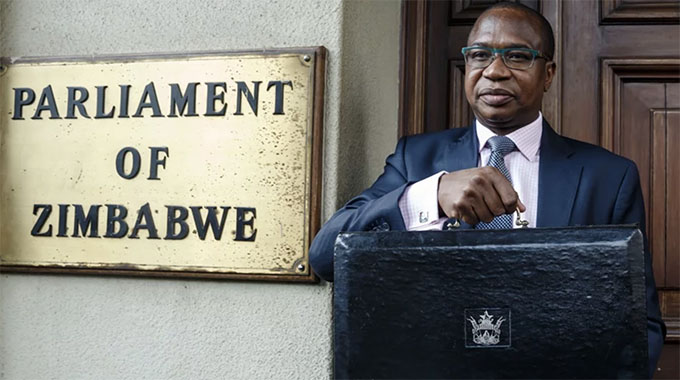Eyes on Budget to protect earnings, improve buying power

Mukudzei Chingwere Herald Reporter
Ordinary people hope today’s budget will confront sustainable measures that help insulate the local currency from erosion, improve buying power by protecting earnings from inflation, ensure stability on the macroeconomic front and greater support for those who rely on the informal economy.
Finance and Economic Development Minister Professor Mthuli Ncube is expected to present the 2022 National Budget this afternoon and, as always, everyone from the ordinary person all the way to top business people want to see improved livelihoods, sustainable economic growth, and fair spreading of that growth, with businesses wanting larger markets and the people wanting to be able to afford what the businesses are selling.
It is expected he will give adequate budgets to continue pressing ahead with the dramatic expansions seen in agriculture, expansions that not only stabilise consumer prices but have started making significant inroads into the poverty that so marked rural Zimbabwe as smallscale farmers are converted into money earning business people, a move that will also help everyone else by creating markets for what they make and sell.
And everyone wants predictable and preferably stable exchange rates, and stable prices, both requiring as well as generating low inflation.
“We expect that Minister Ncube should ensure there is disposable income for ordinary people, it has been a difficult year,” said Amai Nyasha from Chitungwiza. “So at least if they put 100 percent tax free band for those who earn less than $30 000, at least people can look forward to Christmas. In addition to that I think the Intermediated Money Transfer Tax of 2 percent should be removed.”
While there is general expectation of resetting tax bands to take into account inflation and so preserve the percentage the taxman takes at original levels instead of the higher percentage when bands remain fixed, dropping a tax is less likely although Minister Ncube has in the past reset the level when the tax comes into play so that small personal payments are exempt.
Mrs Violet Tokora said the macroeconomic reforms have tight control of liquidity, which means there are no longer enough Zimbabwe dollars in circulation to affect exchange rates on the formal market.
That tight control was built on monthly budget surpluses, which controls total money supply, and on measures taken to prevent vast anonymous transfers of money already in circulation.

Mrs Violet Topora
However, she argues the measures have been hugely successful on the formal market and but failed to control the black market to the same degree.
“Government has done well to control and manage money circulation, the surplus we had was used to buy Covid-19 vaccines and as a country we are doing well on that front.
“The biggest challenge for now is the availability of foreign currency on the formal market for ordinary people.
“Yes, Government said we should be accessing money on the formal market but we are not. Maybe it’s in short supply or people manning those offices are corrupt which makes the rest of us fail to access the money.
“This increases demand and people end up resorting to the black market for foreign currency which is very expensive and unsustainable,” said Mrs Tokora.
Mr Pritchard Tunha said people should easily access their money in banks without the hassle of going through very long queues.

Mr Pritchard Tunha
He argues that those at the Treasury should strive for prices to remain stable so that there is no rush for people to withdraw their salaries and spend before they are eroded.
Another Harare resident Mrs

Pamela Midzi
said the Government should consider increasing salaries as a way of ensuring people have more spending power.
“Salaries we are getting are not commensurate with the prices of basic commodities and it is not enough to pay utility bills. I think the Government should consider returning to US dollar salaries since most of our expenses like rentals are not paid in local currency,” said Mrs Midzi.
However, the Government has indicated that it would be unable to pay in US dollars given that it has reintroduced the local currency.
Mr Ronald Mufandaedza wants a bit more than just stable prices. He would like to see falling prices of basic commodities.

Mr Ronald Mufandaedza
“We want a situation where prices, especially of basic commodities, go down so that everyone can easily access them.
“We also want to see the Government investing more in the public transport system,” said Mr Mufandaedza raising a common complaint that while a lot of progress has been made in the Zupco sphere, most people using public transport want to see more buses.
Ms Angela Gora commented on the ban of importing vehicles older than 10 years.
“Banning old cars is a good idea but I think they should maybe say 15 years or more, 10 years is too stringent especially considering that we are buying second hand cars,” she said.
Some said the Covid-19 pandemic worsened standards of living. While few lost formal jobs, many in the informal sectors saw both falls in income. Many informal businesses are reviving, and the Government has now started a process of quite large budgets for programmes that will see proper and healthy premises built for small businesses by central Government on council land, but there are many who would like their workshops and market stalls sooner.
Health budgets shot up with Covid-19, but there is a desire to see more of the social payments for those who need them because of Covid-19.









Comments